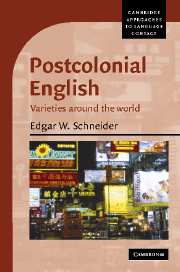Book contents
- Frontmatter
- Contents
- List of maps, figures, and tables
- Series editor's foreword
- Preface and acknowledgments
- List of abbreviations
- 1 Introduction
- 2 Charting the territory: Postcolonial Englishes as a field of linguistic investigation
- 3 The evolution of Postcolonial Englishes: the Dynamic Model
- 4 Linguistic aspects of nativization
- 5 Countries along the cycle: case studies
- 6 The cycle in hindsight: the emergence of American English
- 7 Conclusion
- Notes
- References
- Index of authors
- Index of subjects
2 - Charting the territory: Postcolonial Englishes as a field of linguistic investigation
Published online by Cambridge University Press: 15 December 2009
- Frontmatter
- Contents
- List of maps, figures, and tables
- Series editor's foreword
- Preface and acknowledgments
- List of abbreviations
- 1 Introduction
- 2 Charting the territory: Postcolonial Englishes as a field of linguistic investigation
- 3 The evolution of Postcolonial Englishes: the Dynamic Model
- 4 Linguistic aspects of nativization
- 5 Countries along the cycle: case studies
- 6 The cycle in hindsight: the emergence of American English
- 7 Conclusion
- Notes
- References
- Index of authors
- Index of subjects
Summary
Ancestry
First and foremost, PCEs are varieties of English, shaped and determined by the sociohistorical conditions of their origins and by the social nature of man. Human beings usually associate closely with other humans nearby and have considerably less contact with people who live far away or in different social circumstances, whom they are less likely to encounter. Hence, they accommodate and adjust their speech forms to those of their friends and neighbors to express solidarity, which is the reason why there are dialects and varieties of languages. The study of PCEs builds upon some precursor disciplines which have investigated such variation and developed methodologies to probe into regional, social, and other types of language variation. Obviously, the popular idea that there is only one “standard” variant, a “correct,” monolithic form of English, with all other realizations being somehow “deviant,” “dialectal,” or “broken,” is misguided. Rather, with Mufwene (2001b) we need to accept that every language consists of an enormously large “pool” of features, linguistic options to choose from if one wishes to express one and the same idea. Choices are possible in vocabulary, pronunciation, word forms, and also the syntactic arrangement of sentence constituents. Which of these choices are made, and how precisely we speak, depends upon and at the same time signals an individual's background. In most instances, as soon as a person starts to speak, listeners will be able to roughly assess where the speaker grew up, in which social circumstances, and how formal or casual is the speech situation being framed.
- Type
- Chapter
- Information
- Postcolonial EnglishVarieties around the World, pp. 8 - 20Publisher: Cambridge University PressPrint publication year: 2007



